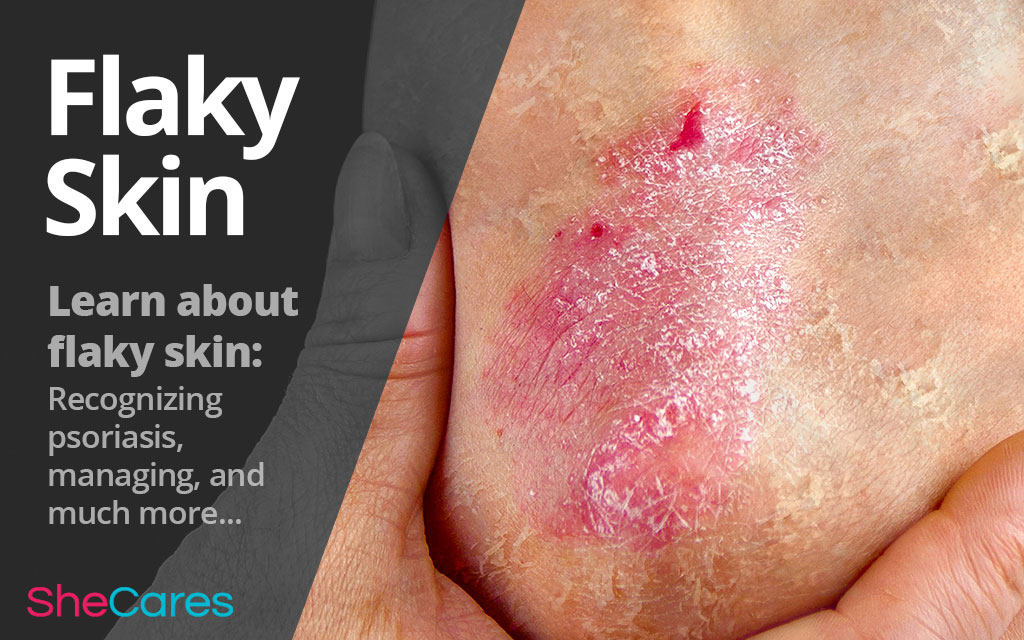When skin gets white and flaky, it is often also itchy, irritating, and sometimes painful. Additionally, it tends to look unsightly, and it may cause small flakes of skin to rub off on clothes or other surfaces. Dealing with this condition can be difficult and frustrating, but understanding how to recognize and manage flaky skin can help to soothe the condition.
Recognizing Flaky Skin
Flaky skin often goes along with scaly or peeling skin. It occurs when skin that has been damaged by something begins to turn white and fall off in small pieces. It is possible for the damaged skin to become hard and shiny - or scaly - before it flakes off as well.
There are a few possible causes of flaky skin, and some of the most common are:
- A skin condition, such as psoriasis
- Dry or dehydrated skin
- Sunburn
Flaky Skin and Psoriasis
Psoriasis is one of the most common skin conditions that can cause flaky skin to appear on the body. It affects 2 - 4% of the population and presents with red, painful, itchy skin covered by scaly and flaky patches. It is not at all contagious. Rather, it seems to be passed down through families, making it genetic. Doctors believe that it is an autoimmune condition, which means the immune system mistakes the skin for something dangerous and attacks it, causing pain and inflammation.
Psoriasis may cover a small area of skin, or it may cover large sections of the body. Dealing with psoriasis is a lifelong endeavor. Psoriasis is a chronic condition, and it sometimes disappears for a period of time before it flares up again.
There are several different types of psoriasis. The most common is called plaque psoriasis, and it causes large areas of red skin that are usually covered by scales, which are sections of white and flaky skin that lie on top of sections of the red skin. Plaque psoriasis can also cause issues with fingernails and toenails.
Managing Flaky Skin
The best way to treat flaky skin is to understand what the cause is. Usually, flaky skin can be soothed by ensuring that the skin receives enough moisture. To ensure the skin is hydrated, you should:
- Avoid taking showers with very hot water, and instead use lukewarm water
- Drink plenty of water to give your body the moisture it needs
- Apply plenty of lotions, creams, or other moisturizers
- Use a humidifier if the air in your home is dry
Managing Psoriasis
Unfortunately, there is no cure for psoriasis, but there are a few ways to treat and manage the symptoms, as well as to try to prevent an outbreak from occurring. Keeping skin hydrated is the first step to treating psoriasis, but if the condition is severe, a doctor will have other suggestions.
Medical treatment for psoriasis often is comprised of medicated creams that can reduce swelling and inflammation of the affected area. Some medications can even cause the immune system to stop attacking the area. For the most severe cases, light therapy is also used to try to soothe the skin. To learn more about how to treat skin problems, read about home remedies for itchy skin.
Sources
- American Academy of Dermatology. (2017). How to relieve itchy skin. Retrieved May 11, 2017, from https://www.aad.org/public/skin-hair-nails/skin-care/itchy-skin
- Mayo Clinic. (2016). Itchy skin (pruritus): Treatment. Retrieved May 11, 2017, from http://www.mayoclinic.org/diseases-conditions/itchy-skin/diagnosis-treatment/treatment/txc-20262931
- National Institutes of Health. (2015). Psoriasis. Retrieved May 11, 2017, from https://medlineplus.gov/ency/article/000434.htm
